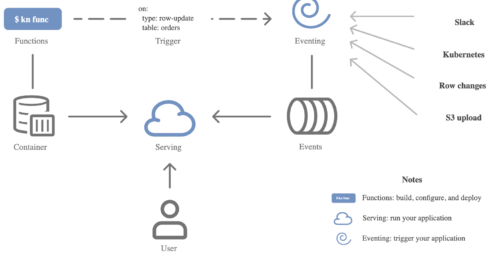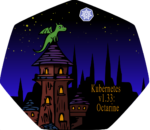
The Cloud Native Computing Foundation (CNCF), which builds sustainable ecosystems for cloud native software, announced the graduation of Knative, a serverless, event-driven application layer on top of Kubernetes.
Knative simplifies how developers build, deploy, and run modern workloads by abstracting the infrastructure concerns such as autoscaling, routing, event delivery, and building containers. It allows teams to focus on architecture and business logic and get started quickly on Kubernetes without needing to ramp up on dozens of Kubernetes concepts and resources. As the C-suite looks to optimize costs and simplify operations, Knative can do so with features like autoscaling to zero to minimize infrastructure waste.
“Knative fills several gaps in the cloud native ecosystem as an easy on-ramp to Kubernetes, with Knative’s eventing acting as the missing skeleton for connecting events to reactions,” said Evan Anderson, Knative co-founder. “It’s gratifying to see the vision that inspired Knative realized and adopted across the CNCF.”
Knative was created in 2018 at Google, with early contributions from partners such as IBM, Red Hat, VMware, and SAP. In 2021, Knative released version 1.0, signaling production readiness, and joined CNCF in 2022 as an incubating project.
Within CNCF’s neutral ecosystem, Knative has attracted hundreds of contributors and many vendors. The project relies on and contributes to the CloudEvents specification for interoperable events, integrates with Buildpacks in the Knative Functions component, and shares base packages with Tekton, a project that originated from Knative’s early build system. Maintainers also contribute features to the Gateway API in order to support Knative workloads. As a Kubernetes-native project, it also complements other cloud native technologies such as observability, networking, and security.
The project roadmap includes Knative Eventing adding a new RequestReply resource, bridging synchronous and asynchronous workloads. This enables more clients, such as MCP clients or legacy applications, to communicate with applications built around an Event Broker. Additionally, Eventing now integrates with Apache Camel Kamelets—bringing new event sources into the ecosystem. For Serving, Knative is adopting the Gateway API to simplify the networking stack and is introducing safer container settings as a default to increase security posture. The project has also switched to OpenTelemetry for metrics and tracing, allowing end-users to emit metrics and traces to their preferred observability provider.
“Knative’s graduation reflects the maturity of serverless technology in the Kubernetes and CNCF ecosystem,” said Chris Aniszczyk, CTO, CNCF. “The project has built a strong contributor base, gained trust from end users and continues to evolve with integrations that address needs, from newer AI workloads to interoperability. We’re proud to support Knative’s growth and excited to see how the community continues to push the boundaries of cloud native and serverless.”
To officially graduate, the project normalized governance documentation, merged earlier distinct committees (Trademark, Steering, and Technical Oversight) into a single Steering Committee by Dec 2024, and defined annual elections and the maintainer lifecycle, documented contribution processes (issues, PRs, and working groups). Further, Knative completed audits and reviews to ensure standards such as a General Technical Review with TAG Runtime & App Delivery, an OSTIF audit with Ada Logics, and a self-assessment completed with TAG Security.







